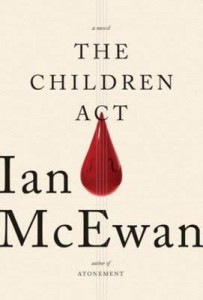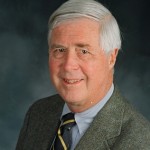 “Who am I to judge?” asked Pope Francis last year, when asked about the Roman Catholic Church’s view of homosexuality. An excellent question, as our lives are full of “judgments” rendered by a wide variety of personalities.
“Who am I to judge?” asked Pope Francis last year, when asked about the Roman Catholic Church’s view of homosexuality. An excellent question, as our lives are full of “judgments” rendered by a wide variety of personalities.
So with interest I turned to Ian McEwan’s latest novel. I’ve read most of his work, thoroughly enjoying his language, characters and situations, set in today’s England. The Children Act opens with a highly respected High Court judge, Fiona Maye, age 59, having a profound disagreement with her professor husband of many years, over his announced decision to have an affair with a younger colleague, just for the excitement of the sex. Her personal life is now in turmoil.
But her professional standing as a judge couldn’t be higher. She has a case for immediate decision involving Adam, a 17-year-old boy with advanced leukemia, who, along with his Jehovah’s Witness parents and the elders of his church, refuses a life-saving blood transfusion. His doctors have appealed to the court and she is about to decide. Fiona rules in favor of the physicians and the boy’s life is saved. Most of us would applaud this decision, but was this a rational decision? The story unfolds from that point. Who is she to judge?
McEwan traces Fiona’s thoughts as she tries to weigh the conflicting opinions, beginning with her own religious beliefs: “Religions, moral systems, her own included, were like peaks in a dense mountain range seen from a great distance, none obviously higher, more important, truer than another. What was to judge?”
After ruling against the parents, their church and the young boy’s own beliefs, and saving his life, she rationalized, “… that churchmen should want to obliterate the potential of a meaningful life in order to hold a theological line did not surprise or concern her. The law itself had similar problems when it allowed doctors to suffocate, dehydrate or starve certain hopeless patients to death, but would not permit the instant relief of a fatal injection.” So we have both “the law” and its interpreters trying to do their imperfect best …
This conundrum drew me back to Richard Posner’s Reflections on Judging, which I read in 2013. He too sees a “rising complexity” in our judicial systems, amplified by a “dizzying advance in technology” and in scientific knowledge. So is our judiciary system responding appropriately to these advances? Unfortunately no, according to the good judge, who plies his trade on the Seventh Circuit Court of Appeals, as well as being a lecturer at the University of Chicago Law School.
His considered opinion (in proper nautical language!), “The judiciary navigates the sea of modernity, slowed, thrown off course, by the barnacles of legal formalism (semantic escapes from reality, impoverished sense of context, fear of math and science, insensitivity to language and culture, mangling of history, superfluous footnotes, verbosity, excessive quotation, reader-unfriendly prose, exaggeration, bluster, obsession with citation form) – an accumulation of many centuries, yet constantly augmented. There is little desire to give the hull a good scraping.”
Fiona wrestles with her decision in the midst of her personal crisis, weighing all the future possibilities. Therein lies the remarkable and surprising aftermath in Ian McEwan’s compelling story.
If you are interested in the entire art of judging, do read both Ian McEwan and Richard Posner.
Who am I to judge? Uncertainty bedevils us all!
Editor’s Note: Review: Ian McEwan’s ‘The Children Act’ is published by Nan Talese/Doubleday, New York 2014 and Richard A. Posner’s ‘Reflections on Judging’ is published by Harvard University Press, Cambridge 2013.
 About the author: Felix Kloman is a sailor, rower, husband, father, grandfather, retired management consultant and, above all, a curious reader and writer. He’s explored how we as human beings and organizations respond to ever-present uncertainty in two books, ‘Mumpsimus Revisited’ (2005) and ‘The Fantods of Risk’ (2008). A 20-year resident of Lyme, he now writes book reviews, mostly of non-fiction that explores our minds, our behavior, our politics and our history. But he does throw in a novel here and there. For more than 50 years, he’s put together the 17 syllables that comprise haiku, the traditional Japanese poetry, and now serves as the self-appointed “poet laureate” of Ashlawn Farms Coffee, where he may be seen on Friday mornings. His wife, Ann, is also a writer, but of mystery novels, all of which begin in a bubbling village in midcoast Maine, strangely reminiscent of the town she and her husband visit every summer.
About the author: Felix Kloman is a sailor, rower, husband, father, grandfather, retired management consultant and, above all, a curious reader and writer. He’s explored how we as human beings and organizations respond to ever-present uncertainty in two books, ‘Mumpsimus Revisited’ (2005) and ‘The Fantods of Risk’ (2008). A 20-year resident of Lyme, he now writes book reviews, mostly of non-fiction that explores our minds, our behavior, our politics and our history. But he does throw in a novel here and there. For more than 50 years, he’s put together the 17 syllables that comprise haiku, the traditional Japanese poetry, and now serves as the self-appointed “poet laureate” of Ashlawn Farms Coffee, where he may be seen on Friday mornings. His wife, Ann, is also a writer, but of mystery novels, all of which begin in a bubbling village in midcoast Maine, strangely reminiscent of the town she and her husband visit every summer.